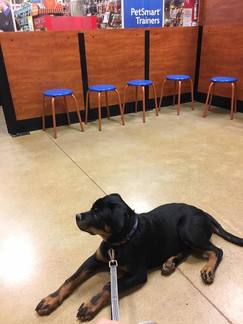 One of my biggest burdens as a trainer is trying to educate owners about the importance of early socialization (before 16 weeks) for puppies, while at the same time doing everything in my power to minimize the risk of exposure to parvovirus (aka parvo). Since starting to run puppy classes in 2013 under the name Paws ‘N Effect, I had never had a puppy with parvo come through any of my facilities (I currently run classes in Elora, Cambridge and offer an in-home board and train service from my home outside Kitchener). That changed this summer with a little Rottweiler puppy named Bear. At 8.5 weeks old, Bear had a case of diarrhea, which was tested and confirmed to be giardia. It appeared to resolve with treatment, but 3 days after treatment ended, it would end up progressing to a very sick 10 week old puppy. Bear was very lucky to survive thanks to excellent care from Beaverdale Animal Hospital and a night at the Emergency Vet Clinic of Waterloo. Aside from treating Bear immediately, the first thing I did upon finding out he had parvo was contact all the owners of puppies in my care and the 2 puppies he had met in classes to notify them and ask them to watch for signs and boost their vaccines ASAP. All puppies in my care were given their next booster shots (most were 11 weeks and given their 2nd shot 1 week early) as a precaution and were closely monitored for symptoms and tested a week later – all 7 dogs in my care tested negative, and the 2 puppies he'd met in class were also clear. I firmly believe the biggest 2 reasons that all the other pups were clear were 1) keeping up to date on vaccines and 2) my strict policy on isolation and cleanup/disinfection when dealing with giardia, which also helps to prevent the spread of parvo. I don’t know exactly when or where he got the virus (the incubation period can vary between 3-14 days). Initially, I blamed myself thinking he got it when we went to get him a life jacket at a pet store (3 days before symptoms), but it could have also been during his first vet visit at 8 weeks (14 days before symptoms) or sometime in between. I will never know, especially since he’d been on medication for giardia, which would may have helped to manage any symptoms if he’d had it earlier. Regardless, I covered the expenses as I didn’t feel right passing them on to the owner. I now require imprinting puppies to be signed up for pet insurance ASAP. As for disinfecting of the facilities, I followed vet recommendations to bleach (I used a 20% solution) every hard surface – walls, floors, cupboards, xpens, crates, etc – and we steam cleaned any soft surfaces. Bear was isolated to a separate yard and a room with a hallway between he and the other pups so he could still see and hear regular household activities, but we had to change clothes, shoes, and wash our hands when crossing the hallway to handle him. To continue his socialization during this time, I would drive him places to people watch from the back of my RAV4, and had people drop treats into his crate to interact with him without touching him. As soon as we got a negative stool sample for him (2 weeks later) we did as much socialization as possible to make up for lost time. Bear is now a very happy and healthy, well-socialized little guy, who is excelling in his puppy classes at PetSmart in Sault Ste. Marie (Sadly there is no Puppy Power there). Despite me having cleaned and disinfected everything, I have made the decision to wait until January to board any pups without their 2nd vaccine because puppies are at higher risk before their 2nd vaccine. Although I did saturate my kennel area with a 20% bleach solution, it is much harder to disinfect outdoor areas, and the virus could potentially live in outdoor environments for 5-7 months. Any owners who have contacted me for imprinting during this time have been asked to start their imprinting with one of my other trainers, and can have their puppy come to me after receiving their second shots if they so choose. Okay – so why am I telling this story? Up until this summer, I had probably trained/boarded over 1000 puppies, giving them an incredible start to life with positive socialization in a controlled environment. I check the vaccine status of every puppy coming into classes or boarding, and have any new puppies coming into my home tested for giardia & other parasites. There is no guarantee with anything you do that your puppy will not contract the disease no matter how careful you are. You could have a breeder have a puppy tested for parvo before you get it, and it wouldn’t test positive until it is symptomatic. You could step through an infected area and bring the disease into your home on the bottom of your shoe, or wildlife could track it into your backyard – it is considered by vets to be “ubiquitous, meaning that it is present in every environment unless regular disinfection is applied” (Pet Assure, 2017). I want you to think about that for a second and then think about places you could take your puppy to socialize that are regularly disinfected with bleach or steam cleaned (pretty much the only ways to kill the virus). I can assure you that myself and any trainer to whom I recommend you take your dog is doing this, and that the low incidence of parvo infection compared to the places the virus is likely present speaks volumes about the efficacy of the vaccine. That said, even with proper vaccination, “a small percentage of dogs do not develop protective immunity and remain susceptible to infection” (American Veterinary Medical Assocation, 2017). This includes adult dogs. There are no guarantees with anything you do. Now I’d like you to consider the number of dogs who end up in shelters due to lack of early training and the importance of socialization. According to a study by the National Council on Pet Population Study and Policy, 96% of surrendered dogs had never had formal training (Arthur, N., 2009). In a Literature Review entitled “Welfare Implications of Socialization of Puppies and Kittens” by the American Veterinary Medical Association, the sensitive socialization period is considered to be from 3-14 weeks of age, during which time puppies are most flexible to exploring new stimuli and environments. After 14 weeks of age, dogs become less flexible and may become fearful in new situations, and fearful or reactive with new people, pets or in new environments (American Veterinary Medical Association, 2015). I highly recommend you click the above hyperlink and read further details on your own, but overall the AVMA recommends thorough socialization by 12-14 weeks of age, with earlier being better and “when well-managed puppy or kitten socialization classes are available, owners are encouraged to take advantage of these as a source of information and a safe environment for socialization and new learning activities” (American Veterinary Medical Association, 2015). Last but not least, I encourage you to know the signs of parvo and don’t hesitate to seek veterinary care if you suspect your puppy may have contracted it. Bear was extremely lucky to have had immediate treatment. Signs include:
Early detection and treatment are critical to successful outcomes, with survival rates approaching 90% with proper treatment (American Veterinary Medical Association, 2017). More information on diagnosis, treatment, and prevention can be found on the AVMA’s website here: Canine Parvovirus. I don’t have statistics on the number of behavioural problems I see that stem from lack of early socialization, but I can tell you that the number would greatly exceed the number of parvo cases I have seen come through my facility. To say that I was discouraged by this case would be an understatement. However, every single puppy owner who I’d contacted to explain the situation was very understanding, and I thank all of you for your support and words of encouragement during a very difficult time. My apologies again to those for whom I had to cancel boarding last minute. Special thanks to Norma Jeanne, Puppy Power’s founder, who assured me that I was doing everything right, that she had been through it before too, and that the owner did not blame her. I don’t think I would have continued to train if it weren’t for the outpouring of support from other trainers and clients during this time. Thank you for your trust and for making the best choices for your dogs. References American Veterinary Medical Association. 2015, June 9. Welfare Implications of Socialization of Puppies and Kittens. Retrieved from https://www.avma.org/KB/Resources/LiteratureReviews/Pages/Welfare-Implications-of-Socialization-of-Puppies-and-Kittens.aspx on October 16, 2017. American Veterinary Medical Association. 2017. Canine Parvovirus. Retrieved from https://www.avma.org/public/PetCare/Pages/canine-parvovirus.aspx on October 16th, 2017. Arthur, Nan. 2009. Chill Out Fido!: How to Calm Your Dog. Wenatchee, Washington USA: Dogwise Publishing. Pet Assure. 2017. Canine Parvovirus: What is it? Retrieved from https://www.petassure.com/new-newsletters/canine-parvovirus-what-is-it on October 16, 2017.
4 Comments
12/27/2021 11:07:25 pm
Thanks for pointing out that a small percentage of dogs do not develop protective immunity and remain susceptible to infection even with proper vaccination. This is helpful because my husband and I will be adopting a Beagle puppy next weekend for our five kids. We are hoping to find veterinary services on Monday that can ensure its overall health and vaccinations every six months.
Reply
6/28/2023 02:56:24 am
Reading about Bear's journey from a sick puppy to a healthy and well-socialized one is truly comforting. It's encouraging to know that the trainer took immediate action, contacting owners and ensuring thorough disinfection to prevent the spread of the virus. It's clear that the dedication and care of the trainer made a significant impact on the well-being of the puppies in their facility.
Reply
10/13/2023 08:35:17 pm
Reading about Bear's experience with parvo tugged at my heartstrings, as I remember a friend's pup named Max facing a similar scare a few years ago. The diligence you displayed, not just for Bear but for all the pups under your care, showcases the dedication and love you have for your job and these furry companions. Your transparency and commitment to ensuring both early socialization and health safety for puppies is commendable.
Reply
The emotional rollercoaster of Bear's battle with parvovirus hit me hard as a reader. The vivid recounting of the struggles, from Bear's initial diarrhea misdiagnosed as giardia to the meticulous disinfection measures and the heartwarming recovery, evoked empathy and concern. The trainer's dedication to both educating puppy owners and maintaining a safe environment showcases a profound commitment to canine well-being, making this post a poignant reminder of the unpredictable challenges that come with fostering a furry companion.
Reply
Leave a Reply. |
AuthorI am a dog owner and a trainer. Every day I learn something new from my dogs and I hope to share experiences that will help people understand their dogs better. Archives
March 2024
Categories |
© Samantha Dejong, B.Sc, CCUI, CTB.ccs, IPDTA-CDT
